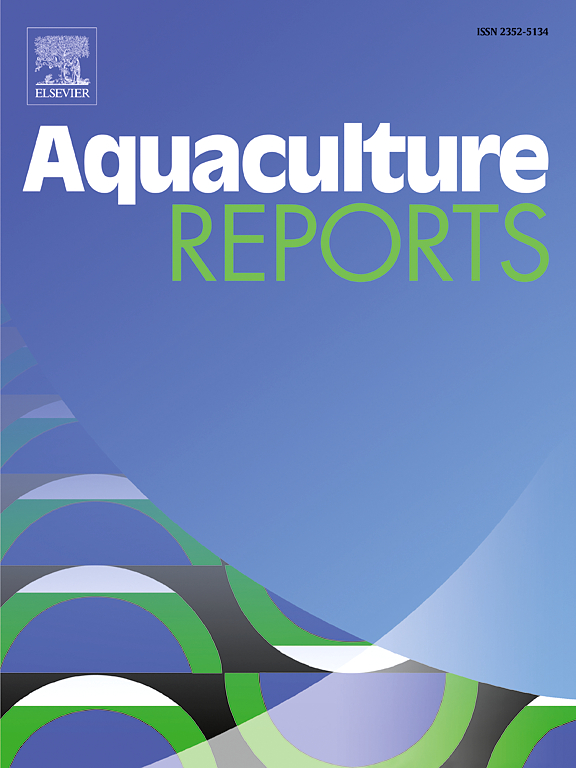植物性饲料中添加必需氨基酸对草鱼生长性能、肠道健康及胆汁酸生物合成的影响
IF 3.7
2区 农林科学
Q1 FISHERIES
引用次数: 0
摘要
高植物蛋白饲料对水产养殖物种的生长和健康有一定的限制。本研究通过在草鱼饲料中添加必需氨基酸,以氨基酸平衡为基础,探讨其在缓解上述挑战中的作用。对照日粮以豆粕、菜籽粕和棉籽粕为主要蛋白质来源。在试验饲粮中添加0.21 %赖氨酸、0.32 %蛋氨酸和0.23 %苏氨酸。试验选取草鱼300尾(61.3 g),随机分为6个网箱,分别饲喂对照饲料和试验饲料,饲喂8周。结果表明,饲粮中添加氨基酸可提高增重率、特定生长率和饲料效率(P <; 0.05)。下调TLR/MyD88/NFκB信号通路及促炎因子mRNA表达(P <; 0.05),减轻肠道炎症。在肠道菌群方面,该治疗增加了ACE和Chao指数,并伴有厚壁菌门丰度的升高和螺旋体和Brevinema的减少(P <; 0.05)。此外,饲粮中添加氨基酸可提高肝脏sm转录物水平和胆固醇含量(P <; 0.05)。它还刺激了cyp7a1 mRNA的表达,导致肝脏胆酸、牛磺胆酸、牛磺鹅去氧胆酸和硫酸糖鹅去氧胆酸3二钠盐水平升高,肠道胆汁酸浓度升高(P <; 0.05)。综上所述,添加必需氨基酸可通过促进肝脏胆固醇和胆汁酸合成,影响肠道菌群组成,重塑宿主胆汁酸循环,缓解肠道炎症,促进草鱼生长。研究结果表明,优化饲料配方中的氨基酸平衡可以改善鱼类的生长性能和健康,同时降低生产成本,从而支持水产养殖业的可持续发展。本文章由计算机程序翻译,如有差异,请以英文原文为准。
Effects of adding essential amino acids to plant-based diets on growth performance, intestinal health and bile acid biosynthesis of grass carp (Ctenopharyngodon idella)
High-plant protein diets can present certain limitations for the growth and health of aquaculture species. By incorporating essential amino acids into grass carp feed based on amino acid balance, this study investigated their role in alleviating the previously mentioned challenges. The control diet consisted of soybean meal, rapeseed meal, and cottonseed meal as the major protein sources. In contrast, the experimental diet was fortified with 0.21 % lysine, 0.32 % methionine, and 0.23 % threonine. A total of 300 grass carp (61.3 g) were randomly allocated into six net cages and fed with either the control or experimental diet for eight weeks. The results demonstrated that dietary amino acid supplementation improved weight gain rate, specific growth rate, and feed efficiency (P < 0.05). Moreover, it downregulated the mRNA expression of the TLR/MyD88/NFκB signaling pathway and pro-inflammatory cytokines (P < 0.05), mitigating intestinal inflammation. Regarding the intestinal microbiota, this treatment increased ACE and Chao indices, accompanied by an elevation in the abundance of Firmicutes and a concomitant reduction in Spirochaetota and Brevinema (P < 0.05). Furthermore, the diet with amino acid supplementation increased hepatic sm transcript levels and cholesterol contents (P < 0.05). It also stimulated the mRNA expression of the cyp7a1, leading to elevated levels of hepatic cholic acid, taurocholic acid, taurochenodeoxycholic acid, and glycochenodeoxycholic acid 3 sulfate disodium salt and increased intestinal bile acid concentrations (P < 0.05). In summary, the essential amino acid supplementation reshaped the bile acid cycle of the host by promoting hepatic cholesterol and bile acid synthesis and influencing the composition of the gut microbiota, alleviated intestinal inflammation, and improved the growth of grass carp. The findings revealed that optimizing the amino acid balance in feed formulations can improve fish growth performance and health while lowering production costs, thereby supporting the sustainable advancement of the aquaculture sector.
求助全文
通过发布文献求助,成功后即可免费获取论文全文。
去求助
来源期刊

Aquaculture Reports
Agricultural and Biological Sciences-Animal Science and Zoology
CiteScore
5.90
自引率
8.10%
发文量
469
审稿时长
77 days
期刊介绍:
Aquaculture Reports will publish original research papers and reviews documenting outstanding science with a regional context and focus, answering the need for high quality information on novel species, systems and regions in emerging areas of aquaculture research and development, such as integrated multi-trophic aquaculture, urban aquaculture, ornamental, unfed aquaculture, offshore aquaculture and others. Papers having industry research as priority and encompassing product development research or current industry practice are encouraged.
 求助内容:
求助内容: 应助结果提醒方式:
应助结果提醒方式:


